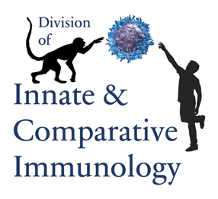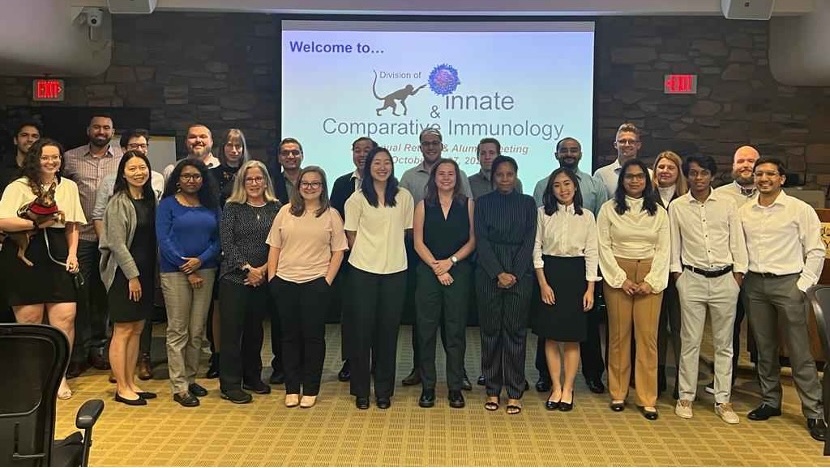Overview

Harnessing innate immunity for cutting edge therapies against global chronic and infectious diseases
The Division of Innate and Comparative Immunology (DICI) focuses on delineating innate immune mechanisms, particularly for natural killer (NK) cells and granulocytes, in controlling viral infections and regulating inflammatory immune responses. Our research spans a broad range of infections, including HIV/SIV, influenza, polyomaviruses (JC, BK), cytomegalovirus (CMV), hepatitis C virus (HCV), and SARS-CoV-2. We investigate immune resilience and its modulation by factors such as aging, injury, and climate change, exploring how environmental stressors affect immune responses throughout the lifespan. DICI is also at the forefront of immune engineering research, developing novel approaches to enhance immune responses for cell-based therapies. Committed to person-first research, we strive to translate our discoveries into therapeutics, with ongoing projects aimed at altering NK cell function in vivo, exploring NK cell-based therapies for HIV and other viral cure strategies, and mitigating inflammatory immune conditions. By comprehensively studying innate immune cell biology, metabolism, and signaling, we can uncover new therapeutic targets and strategies to enhance immune function, ultimately improving patient outcomes and quality of life.
DICI expertise is rooted in over a decade of studying innate immune responses in both humans and nonhuman primate (NHP) models. Throughout our efforts, we have made significant contributions to the fields of virology and immunology, including:
- First description and characterization of IL-17/IL-22-producing NKp44+ mucosa-restricted innate lymphoid cells (ILCs) in infection models, and delineation of mechanisms leading to their depletion during lentivirus infections.
- Pioneering work on antigen recall responses by adaptive NK cells, including the first evidence of NK cell memory in any primate species and description of human antigen-specific NK cell memory against HIV and influenza.
- First demonstration of the main mechanism underlying antigen-specific memory NK cell responses, involving recognition of viral antigens via the NKG2/HLA-E axis, and which is conserved against a wide range of viral infections including HIV/SIV, influenza, SARS-CoV-2, and polyomavirus infections.
- First evidence of robust NK cell responses against human polyomaviruses, revealing that NKG2D and its ligand ULBP2 play a key role in immune recognition of polyomavirus-infected cells by NK cells.
- Characterization of human and NHP granulocytic effector cells during chronic lentiviral infection, revealing depletion of jejunal eosinophils and vaginal neutrophils in SIV/SHIV-infected macaques.
- Investigation of plasmacytoid dendritic cell (pDC) dynamics during SIV infection, showing their systemic redistribution, accumulation in colon, jejunum, and gut-draining lymph nodes.
- Elucidation of mechanisms of NK cell dysfunctions in HIV and aging, including dysregulated signaling pathways and metabolic perturbations.
- Investigation of antiviral NK cells in the control of hepaciviral infections using small nonhuman primate models.
- Development of innovative research on the impact of climate change on immune resilience, exploring how climate-related stressors influence immune responses, with potential implications for vaccine efficacy and overall health outcomes.
- State-of-the-art immune engineering approaches to enhance and modulate immune responses for therapeutic purposes, including CRISPR-Cas9 gene editing, lentiviral vector-mediated delivery of transgenes or transfection of mRNA-LNP combined with the generation of cytokine-induced memory NK cells and clonally-expanded, therapeutically enhanced NK cells.
- To quantify and qualify immune responses, we utilize the most cutting-eduge technologies, including spectral flow cytometry, RNA-seq, CITE-seq, mass spectrometry proteomics, multiplex imaging cytometry, and multiplex Luminex signaling.
- To achieve our goals, we have been consistently assembling study teams spanning a broad range of expertise beyond innate cellular immunology, leveraging the background and experience of local, national as well as international collaborators, including close collaborations within Duke Department of Surgery to study innate immunity in transplantation and immune resilience in surgical outcomes.
DICI Updates
- Keith Reeves gave a Keynote Address at the 2024 Duke Human Vaccine Institute Training and Mentoring Program, Fall Trainee Retreat: “Defying Gravity on the Yellow Brick Road to Academic Success: Potholes, Side-quests, and Oracles.”
- Keith Reeves was named 2024 Visiting Professor at the Carver School of Medicine at the University of Iowa.
- Philippe Rascle gave a presentation in November at the Annual Joint Meeting of the NIH Martin Delaney Collaboratories for HIV Cure, hosted by The National Institute of Allergy and Infectious Diseases: “SIV-derived peptides induce rhesus macaque antigen-specific NK cell responses in SIV infection.”
Lab Members
Additional Faculty
Laboratory Staff

Rhianna Jones
Senior Lab Research Analyst
2017 - present
Griffin Woolley
Scientific Program Leader I
2019 - present
Kyle Kroll
Bioinformatician
2017 - present
Karen Terry
Manager, Immunology and Molecular Biology
2022 - present
Harikrishnan Balachandran
Senior Lab Research Analyst
2022 - present
Sho Sugawara
Postdoctoral Associate
2019 - present
Philippe Rascle
Postdoctoral Associate
2021 - present
RJ Bouch
Postdoctoral Associate
2023 - present
Andrew Hudson
Lab Research Analyst I
2022 - present
Past Members
Simon Gressens
Visiting Grad Student
2023 - 2024
Alayna Pruitt
Lab Research Analyst
2023 - 2024
Brady Hueber
Lab Research Analyst
2017 - 2024
Esther Lee
Research Technician
2021 - 2023
Melissa Craemer
Lab Research Analyst
2022 - 2023
Ameera Afifi
Lab Research Analyst
2022-2023
Matt Mosher
Research Technician
2020 - 2022
Daniel Ram
Postdoctoral Associate
2019 - 2021
Val Varner
Lab Manager
2014 - 2021
Taylor Yoder
Lab Analyst
2019 - 2021
Michelle Lifton
Flow Core Manager
Olivier Lucar
Postdoctoral Associate
2018 - 2020
Rachel Hindin
Flow Technician
2018 - 2020
Alexandria Werner
Summer student
2019 - 2019
Spandan Shah
Staff Scientist
2016 - 2019
Joshua Ghofrani
Lab Analyst
2016 - 2019
Somuayiro Nwokike
Summer student
2018 - 2018
Christian Arias
Masters student
2018 - 2018
Scott Smith
Lab Analyst
2016 - 2018
Vaishnavi Parthasarthy
Flow Technician
2017 - 2018
Chiadika Nwanze
Summer student
2017 - 2017
Mary Laughridge
Flow Technician
2016 - 2017
Amanda Jimenez
Research Technician
2016 - 2017
George Tweet
Flow Technician
2016 - 2017
Jamie Schaffer
Postdoctoral Associate
2014 - 2017
Haiying Li
Postdoctoral Associate
2013 - 2017
Tristan Evans
Research Technician
2012 - 2014
Academic and Industry Collaborators
- Abcurro Inc.
- Beth Israel Lahey Health
- Bioqual Inc.
- Bio-Techne
- Bluebird Bio
- Cornell University
- Emory University
- Harvard Medical School
- Institut Pasteur
- Intima Biosciences
- New Iberia Primate Research Center
- North Carolina Environmental Justice Network
- Oregon Health Sciences University
- Robert Debré Hospital
- San Raffaele Scientific Institute
- ScaleReady Inc.
- Tufts University
- Tulane National Primate Research Center
- Uniformed Health Sciences University
- University of Alabama at Birmingham
- University of California San Francisco
- University of Cincinnati
- University of Hawaii
- University of Iowa
- University of Maryland
- University of Miami
- University of Minnesota
- University of North Carolina at Chapel Hill
- Wake Forest University
- Wistar Institute
Contact Us
We are always looking for motivated, curious and hardworking individuals to join our team. If you are interested in learning more, please email gw108@duke.edu and include the position you are seeking (e.g., graduate student, postdoc, analyst, etc.) and how your research interests intersect with our lab’s mission.
Are you interested in collaborating?
We support team science and would love to hear about your work and how we can engage with you. Please email gw108@duke.edu.

